http://halfmd.wordpress.com/2007/03/23/financial-analysis-of-the-health-professions-scholarship-program/
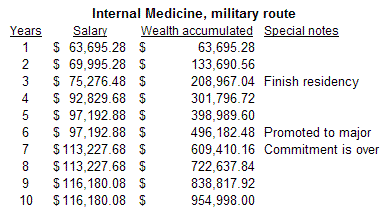
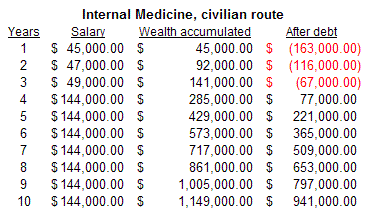
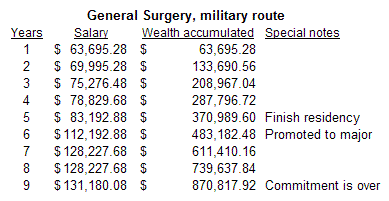
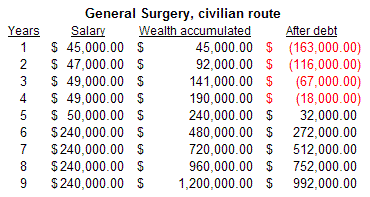
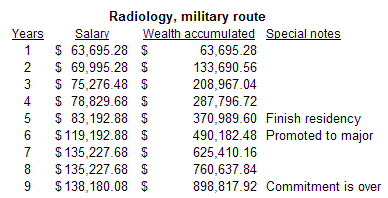
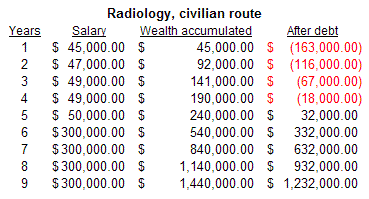
Financial analysis of the Health Professions Scholarship Program
Each year, military recruiters descend upon medical schools and pre-med fairs with the intention of signing people up for either the Army, Navy, or Air Force. Their goal is to fill the military with physicians to care for the soldiers in battle. They will cite patriotism and throw out stories of hero doctors and tell you than you (yes YOU) can be a Hero, MD. The greatest incentive they have is the Health Professions Scholarship Program. HPSP will pay for all of your tuition, fees, books, and supplies. All you have to do in return is serve a commitment of one year in the military for each year you take the scholarship.
The Student Doctor Network has a forum dedicated to military medicine. Many current and former active duty physicians will attempt to dissuade candidates from joining using a variety of illustrative stories to show that the mil med is overly bureaucratic, promotes ineffective leaders, and punishers free thinkers and whistle blowers. Think Walter Reed, but on a nation-wide scale. While the posters of SDN have their own reasons for their dissatisfaction with the Defense Department, my goal is to provide a quick and dirty financial comparison of HPSP to the civilian route. In other words, is the scholarship worth it?
First, let’s see how much the military is paying. I’ll use my school as an example.
Tuition = $30,000
Health Insurance = $2,500
Books = $1,500
Supplies = $700
Laptop rental = $200
Health Insurance = $2,500
Books = $1,500
Supplies = $700
Laptop rental = $200
Rounding up, the military is paying about $35,000 directly for my schooling. I also get $17,000 a year for a stipend. Over the course of four years, the military will have paid $208,000 for me to go to medical school. Now let’s do a comparison of different specialties and see how they stack up to HPSP. For salaries of military doctors, I used the Navy’s Pay Calculator. For the salaries of civilian residents, I took a rough average of several hospitals’ pay tables for post-graduate medical education. For the salaries of civilian doctors, I used the information provided by Washington University’s Residency Web.
Let’s start with internal medicine. I’m going to make a few big assumptions:
- No deployments
- I used my zip code (a rather expensive area to live) for the Pay Calculator
- No inflation or changes in salary for either civilian doctors or military personnel.
- No interest rates on student loans.
- The military doctor has no prior experience and gets promoted to major after six years in service.
For the civilian doctor, let’s use a similar table. Since I’m going to account for the $208,000 in debt that this person has, I’ve added another column, Wealth after debt.
From these tables we see that at the 7 year mark—the point at which the HPSP commitment is over—the military doctor comes out ahead. In fact, even after the ten year mark the military physician has accumulated more wealth.
Now let’s run the same course for a general surgeon:
After just three years in practice, the civilian route wins. If these two surgeons practice medicine for the same amount of time, the military doctor will never catch up.
Now let’s consider a radiologist:
Here, the civilian route wins out after just 2 years of practice.
Conclusions: the Health Professions Scholarship Program is not a good financial motivator for luring people into the military. Only primary care physicians will see a financial benefit for joining the program. While my assumptions place limitations on the overall accuracy of my calculations, I stand by my initial statement. Worth noting, however, is that the military has no malpractice insurance and that there are lots of benefits such as free healthcare, cheap shopping and entertainment on base, and a tax break of almost $10,000. Also, the federal government has authorized the military to raise the HPSP stipend from $17,000 to $30,000 a year—although no appropriations have been made. In some urban areas, military students are forced to take out loans to make up for the paltry stipend that we graduate students are receiving. By raising the stipend, students will be able to live comfortably without resorting to more loans—something HPSP was supposed to do away with.



Howie said,
halfmd said,
Nope said,
- leverage
and – Student Doctor Network!
NavyDO said,
AF Doc said,
halfmd said,
jeff said,
Think said,
AF_Primarycare said,
For those whose life is motivate by money the AF would not be for you, but that is not why I get up in the morning.
Navymedstudent said,
SpouseofaResident said,
ENSNavymedstudent said,
The military is strained for doctors right now, and does try to entice people with bonuses and cash, but if that is all you are thinking about, I would strongly suggest that you do not accept the scholarship and leave the opportunity available for someone who is more concerned with service than necessarily money.
Cthulhu Dreams said,
College said,
student said,
halfmd said,
fizzlemed said,
Joe said,
Wes said,
silvanus said,
DecidingWhichPath said,
Mike said,
Jambony said,
Military Surgeon said,
1. If you want to serve your country, take the scholarship.
2. If you know you are going into primary care (e.g., family practice, pediatrics. internal medicine) and know that you do not want to complete a civilian residency – Take the scholarship.
3. If you know you want to be a surgeon – Don’t take the scholarship. Get into a civilian residency, make sure you don’t want to complete a fellowship, then look into the Military Financial Assistance Program (FAP). In fact, If you’ve attend a state medical school, you might actually be money ahead with the FAP route (vs. HPSP).
Michelle said,
Dean said,
Kevin said,
1. The Navy (I cannot say about other branches) will not force you into a residency you do not want. If you do not get the residency you want, you can do a GMO tour, flight surgery, transitional year, undersea medicine, or defer to civilian residency. As the Navy is getting rid of GMO tours, civilian deferments will be much more common.
2. As others pointed out, student loans rack up huge amounts of interest.
3. Investing the positive cash flow you have during medical school means you to EARN interest. Over 7 to 13 years, this can add up.
4. There is now a $20,000 signing bonus
5. Monthly stipend payments are $1981 as of July 2009
6. The tax benefits are about $6000 PER YEAR (Again, consider interest earned by investing this)
7. You can’t factor in any loans you may take out in addition to your stipend while on HPSP because you would be taking the same amount of money out in loans as a civilian.
8. Cost of living in the military is drastically lower than in the civilian world. You get discounts everywhere, all your purchases at exchanges and commissaries are tax free, these places usually have very good deals, free health insurance, and no malpractice.
AFHPSP said,
Manny said,
Jon said,
ICEMAN720 said,
Nontrad said,
FutureReliefDoc said,
2. I have no savings, and about 40kd of debt (undergraduate loans and a car loan). My dad is a trucker without a college education and my mom is a social worker so family contributions are not an option.
3. I am not going into medicine for the money. My ultimate goal is to work for an organization like Doctors Without Borders, or Partners in Health. Traveling to random places after I graduate isn’t deterrent for me. It’s a resume builder.
4. I might want to go into a “low paying” specialty like family or internal medicine.
5. Members of my family have served in the military, and although I don’t think I will want to make a career of Air Force, I don’t mind serving.
Lauren said,
isdh said,
JTAC WIFE said,
JW said,
Victor Johnson said,
Ameera said,
Future - Navy - Gal said,